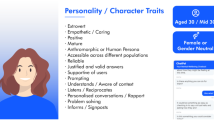Abstract
Mental health and mental wellbeing have become an important factor to many citizens navigating their way through their environment and in the work place. New technology solutions such as chatbots are potential channels for supporting and coaching users to maintain a good state of mental wellbeing. Chatbots have the added value of providing social conversations and coaching 24/7 outside from conventional mental health services. However, little is known about the acceptability and user led requirements of this technology. This paper uses a living lab approach to elicit requirements, opinions and attitudes towards the use of chatbots for supporting mental health. The data collected was acquired from people living with anxiety or mild depression in a workshop setting. The audio of the workshop was recorded and a thematic analysis was carried out. The results are the co-created functional requirements and a number of use case scenarios that can be of interest to guide future development of chatbots in the mental health domain.
Access this chapter
Tax calculation will be finalised at checkout
Purchases are for personal use only
Similar content being viewed by others
Notes
- 1.
There are slight differences between these terms, specially in their academic use as explained in [10], but we use the term ‘chatbot’ because it is more familiar to the end user and thus facilitates co-creation approaches.
References
Abd-alrazaq AA, Alajlani M, Alalwan AA, Bewick BM, Gardner P, Househ M (2019) An overview of the features of chatbots in mental health: a scoping review. Int J Med Inf 132:103978
Cummins N, Scherer S, Krajewski J, Schnieder S, Epps J, Quatieri TF (2015) A review of depression and suicide risk assessment using speech analysis. Speech Commun 71:10–49
Fitzpatrick KK, Darcy A, Vierhile M (2017) Delivering cognitive behavior therapy to young adults with symptoms of depression and anxiety using a fully automated conversational agent (woebot): a randomized controlled trial. JMIR Mental Health 4(2):e19
Greenhalgh T, Jackson C, Shaw S, Janamian T (2016) Achieving research impact through co-creation in community-based health services: literature review and case study. Milbank Q. 94(2):392–429
Guest G, MacQueen KM, Namey EE (2011) Applied Thematic Analysis. SAGE Publications, Thousand Oaks
Hollis C, Morriss R, Martin J, Amani S, Cotton R, Denis M, Lewis S (2015) Technological innovations in mental healthcare: harnessing the digital revolution. Brit J Psychiatry J Mental Sci 206(4):263–265
Inkster B, Sarda S, Subramanian V (2018) An empathy-driven, conversational artificial intelligence agent (Wysa) for digital mental well-being: real-world data evaluation mixed-methods Study. JMIR mHealth uHealth 6(11):e12106
Jull J, Giles A, Graham ID (2017) Community-based participatory research and integrated knowledge translation: advancing the co-creation of knowledge. Implementation Sci 12(1):150
Lee M, Ackermans S, van As N, Chang H, Lucas E, IJsselsteijn W (2019) Caring for vincent: a chatbot for self-compassion. In: Proceedings of the 2019 CHI Conference on Human Factors in Computing Systems, CHI ’19, Glasgow, Scotland UK , pp 1–13
McTear M, Callejas Z, Barres DG (2016) The Conversational Interface: Talking to Smart Devices. Springer, Heidelberg
Mulvenna MD, Bergvall-Kåreborn B, Galbraith B, Wallace J, Martin S (2011) Living labs are innovation catalysts. In: Howlett RJ (ed) Innovation through Knowledge Transfer 2010. Springer, Heidelberg, pp 253–264
Ringeval F, Schuller B, Valstar M, Cummins N, Cowie R, Tavabi L, Schmitt M, Alisamir S, Amiriparian S, Messner EM, Song S, Liu S, Zhao Z, Mallol-Ragolta A, Ren Z, Soleymani M, Pantic M (2019) AVEC 2019 workshop and challenge: state-of-mind, detecting depression with AI, and cross-cultural affect recognition. In: Proceedings of AVEC ’19. ACM Press, Nice
Ta V, Griffith C, Boatfield C, Wang X, Civitello M, Bader H, DeCero E, Loggarakis A (2020) User experiences of social support from companion chatbots in everyday contexts: thematic analysis. J Med Internet Res 22(3):e16235
Vaidyam AN, Wisniewski H, Halamka JD, Kashavan MS, Torous JB (2019) Chatbots and conversational agents in mental health: a review of the psychiatric landscape. Can J Psychiatry 64(7):456–464
World Health Organization, Victorian Health Promotion Foundation, University of Melbourne: Promoting mental health: concepts, emerging evidence and practice. World Health Organization (2004). https://apps.who.int/iris/bitstream/handle/10665/42940/9241591595.pdf
Acknowledgements
This research has received funding from the European Union’s Horizon 2020 research and innovation programme under grant agreement No 823907 (MENHIR: Mental health monitoring through interactive conversations https://menhir-project.eu).
Author information
Authors and Affiliations
Corresponding author
Editor information
Editors and Affiliations
Rights and permissions
Copyright information
© 2021 The Editor(s) (if applicable) and The Author(s), under exclusive license to Springer Nature Singapore Pte Ltd.
About this chapter
Cite this chapter
Benítez-Guijarro, A. et al. (2021). Co-creating Requirements and Assessing End-User Acceptability of a Voice-Based Chatbot to Support Mental Health: A Thematic Analysis of a Living Lab Workshop. In: D'Haro, L.F., Callejas, Z., Nakamura, S. (eds) Conversational Dialogue Systems for the Next Decade. Lecture Notes in Electrical Engineering, vol 704. Springer, Singapore. https://doi.org/10.1007/978-981-15-8395-7_15
Download citation
DOI: https://doi.org/10.1007/978-981-15-8395-7_15
Published:
Publisher Name: Springer, Singapore
Print ISBN: 978-981-15-8394-0
Online ISBN: 978-981-15-8395-7
eBook Packages: EngineeringEngineering (R0)





